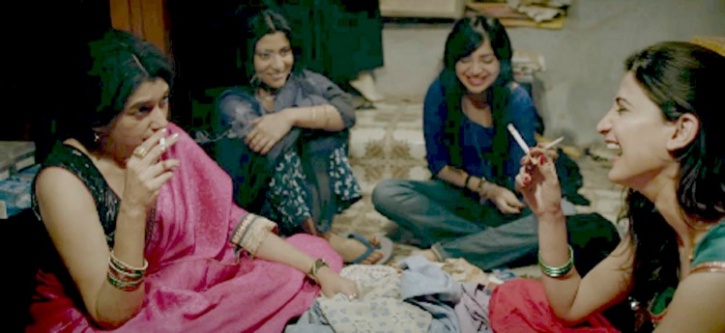When we first saw the trailer of “Lipstick Under My Burkha” came out, we were pleasantly surprised and looking forward to seeing a movie with strong female characters, portraying real life issues. However, we were taken aback by news of the movie being banned for being “Too ladylike”.
We got a chance to speak to the director of the movie, Ms Alankrita Shrivastava, on what her thoughts are on this matter.
1. What was your idea behind making this movie, the thought which you wanted to convey to your audience?
I just wanted to tell the story of four ordinary women, who are in search of a little freedom. Women who dare to dream even when the world around them is restricting and confining them. I just want the audience to feel their ups and downs, their joys and sorrows, their tears and laughter for that 2 hours. The story was born out of my own feeling of not feeling fully free as a woman. The feeling that something keeps holding me back. That somehow there are some chains inside of me that keep me tied. I yearn for freedom. And that yearning is what the film is about.
2. As an audience, we’re allowed to watch movies like Mastizaade, Kya Kool Hain Hum – which are overtly objectifying women, and perpetuating sexual harassment against women, but there is uproar when a movie like Lipstick Under My Burkha. What is your opinion on this, and on freedom of expression in cinema in general?
I believe that popular Indian culture is ruled by the male gaze. There is lots of sexual content available in films. But it caters to the fantasy of men. As long as the desire of heterosexual men is being fulfilled, there is no issue with censorship at all. There can be double meaning dialogues, the camera can randomly move up and down the woman’s body mindlessly, it is all okay. The moment the point of view is female, the CBFC claims to have a problem. The moment women are telling their own intimate stories from their own point of view, the content becomes dangerous. This systematic pushing of a certain kind of content, while systematically stifling “lady oriented” content is quite scary. This means they are really pushing the patriarchy agenda, actively. In a country that claims to promise equal rights to women, the systematic legitimized silencing of women’s voices is unacceptable.
The CBFC has made a clear attack on women’s rights. They need to be called out on it. Who says that the male gaze is more important than the female gaze? Who says that men’s voices matter, but women’s don’t. This is 2017 and we cannot let this kind of Government authorized sexism continue. It is very telling that the CBFC is silencing the voices of women in India. A country wrecked by violence and discrimination against women – from the time the female is a fetus till she dies. This a country where women are regularly sexually assaulted on the streets, and films often portray stalking and harassment as forms of courtship. There is something sick and ugly in our society that allows women to be disrespected and violated at every step. The CBFC’s decision is symptomatic of that very ugliness. Rather than help create a healthy popular culture that gives space to all kinds of points of view, all kinds of narratives, the CBFC wants to shut down the voices of women. That is unfair. And wrong. Censorship and Freedom of Expression cannot co-exist. In a democracy where adult citizens are considered responsible enough to vote they must why aren’t they considered responsible enough to be able to choose the films they want to watch? Freedom of Expression is a must in a free country. The concept of censorship is antithetical to it really. The CBFC cannot continue to be the “moral guardian” of the country. Filmmakers and artistes need to be able to create works freely, and the audience must be able to engage in it freely. I think it is a joke on how archaic the CBFC is, if it thinks it can get away with stifling freedom of expression and women’s rights like this.
The CBFC in its narrow minded , uneducated, illogical and regressive way of thinking needs to be done away with. They either pretend to be ignorant, or are completely ignorant of the dynamics of cinema and society, the politics of representation, the male gaze versus the female gaze, different kinds of narratives in world cinema.
A more educated and autonomous body can certify films according to age. As citizens, we often complain about the quality of our films. I am certain that this move away from censorship will help improve the quality of our films too. We can then stop doing as much self-censoring as we ordinarily do. And like filmmakers of other free and democratic countries, try to set the bar higher.
3. In this whole incidence of your movie being denied certification, how do you think social media has helped or harmed you?
I think social media has been a real boon. I have understood the power of twitter to connect people across the globe.
It is fantastic, how much we can achieve through social media. In fact, I have not experienced much trolling. Or maybe I just tend to ignore the odd negative aggressive tweet. But by and large on Facebook and twitter I have been flooded with support. And it is the social media that has made me realize how women in this country are aching for an equal space in popular culture.
While censorship is a sensitive matter in this country, what is needed is a uniform set of rules for censoring and certifying creative expression. It is appalling that while sexual harassment of women is glorified and celebrated in our cinema, movies which intend to portray progressive thoughts are held back. We thank Ms Shrivastava for speaking with us, and hope that the matter resolves and the movie is released soon.





